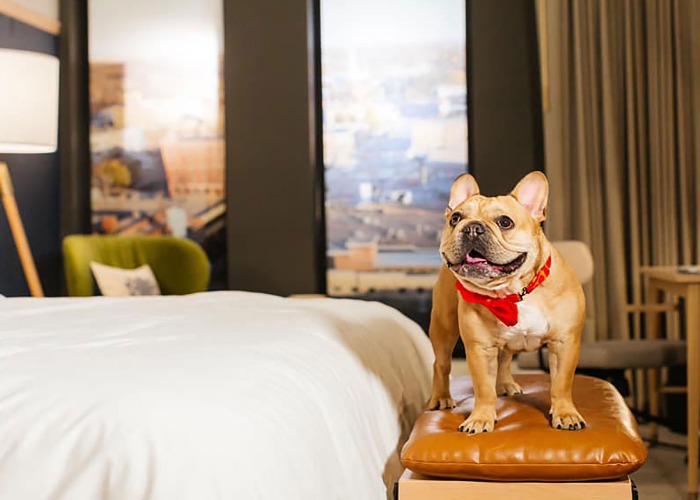Key Takeaways
Over 60% of American households own pets, increasing the demand for pet-friendly accommodations.
Pet-friendly hotels can enhance the travel experience for pet owners, making vacations more enjoyable and stress-free.
Hotels that allow pets often see increased occupancy rates and revenue from pet fees and services.
Offering essential amenities and clear policies can help hotels create a welcoming environment for pets and their owners.
Successful pet-friendly hotels often receive positive customer feedback and build strong brand loyalty.
Pet Ownership Statistics and Its Impact
Pet ownership is on the rise, with over 60% of American households now owning a pet. This significant statistic highlights a growing trend: people are increasingly considering their pets as part of the family. As a result, they want to include their furry friends in their travel plans.
Because of this trend, the hospitality industry has seen a surge in demand for pet-friendly accommodations. Travelers are actively seeking out hotels that welcome pets, making it essential for hoteliers to adapt to this new market demand.
“The best pet-friendly hotel in every …” from www.loveexploring.com and used with no modifications.
High Demand for Pet-Friendly Accommodations
The demand for pet-friendly accommodations has never been higher. Websites like PetsWelcome, BringFido, Expedia, and Tripadvisor now feature extensive listings of hotels that allow pets. These platforms cater specifically to pet owners, making it easier for them to find suitable places to stay.
Most importantly, travelers are not just looking for a place where their pets are tolerated; they want hotels that actively welcome and cater to their pets’ needs. This shift in consumer behavior is driving hotels to go the extra mile in providing pet-friendly amenities and services.
Benefits of Pet-Friendly Hotels for Guests
Enhanced Travel Experience
One of the main benefits of pet-friendly hotels is the enhanced travel experience they offer to pet owners. When pets are welcomed, guests can fully enjoy their vacations without the worry of leaving their furry friends behind.
Imagine being able to take your dog for a walk on the beach or having your cat curled up beside you in a cozy hotel room. These experiences make vacations more memorable and enjoyable for pet owners. For instance, Washington Park in Alameda offers a beautiful setting for pet-friendly activities.
Reduced Stress for Pet Owners
Traveling can be stressful, especially for pet owners who are concerned about their pets’ well-being. Pet-friendly hotels help reduce this stress by providing a safe and comfortable environment for pets.
Besides that, knowing that their pets are welcome allows owners to relax and focus on enjoying their trip. This peace of mind is invaluable and can make a significant difference in the overall travel experience.
Inclusive Vacation Opportunities
Pet-friendly hotels offer inclusive vacation opportunities, allowing families to travel together without leaving anyone behind. For many pet owners, pets are part of the family, and the idea of excluding them from vacations is unthinkable.
By welcoming pets, hotels create an inclusive environment where everyone, including pets, can enjoy a memorable vacation. This inclusivity fosters a sense of belonging and enhances the overall travel experience.
Revenue from Pet Fees and Services
Allowing pets in hotels isn’t just about making guests happy; it’s also a smart business move. Hotels can charge pet fees, which can range from $20 to $100 per stay, depending on the hotel’s policy and the type of pet. These fees can significantly boost the hotel’s revenue.
Additionally, many hotels offer pet-specific services such as grooming, pet-sitting, and even special pet meals. These services not only generate extra income but also enhance the guest experience, making it more likely for pet owners to return.
Brand Loyalty and Repeat Bookings
When a hotel is known for being pet-friendly, it builds a strong sense of brand loyalty among pet owners. Guests who have a positive experience with their pets are more likely to book the same hotel for future trips. This repeat business is invaluable and can lead to long-term customer relationships.
Moreover, happy pet owners are likely to share their positive experiences with friends, family, and online review sites. This word-of-mouth marketing can attract new customers who are looking for pet-friendly accommodations.
“Pet Friendly Hotels: Must Have Facilities” from blog.ferplast.com and used with no modifications.
Creating a Pet-Friendly Environment
Creating a pet-friendly environment involves more than just allowing pets to stay in the hotel. It requires thoughtful planning and the provision of essential amenities to ensure both pets and their owners have a comfortable and enjoyable experience. For example, providing pet-friendly plants in the hotel grounds can enhance the experience for pet owners.
Essential Amenities for Pets
Food and water bowls
Pet beds and blankets
Designated outdoor play areas
Pet waste disposal stations
Welcome treats or toys
By offering these amenities, hotels can make pets feel more at home, which in turn makes their owners more satisfied with their stay. Simple touches like a cozy pet bed or a welcome treat can make a big difference in the overall experience.
Clear Policies and Guidelines
To ensure a smooth experience for all guests, it’s crucial for hotels to have clear policies and guidelines regarding pet stays. These policies should be prominently displayed on the hotel’s website and communicated to guests at the time of booking.
Policies might include information on pet fees, size or breed restrictions, and designated pet-friendly areas within the hotel. Clear guidelines help manage guest expectations and prevent any misunderstandings or issues during the stay.
Pet-Welcoming Staff Training
Staff training is another essential component of creating a pet-friendly environment. Hotel staff should be trained on how to interact with pets and their owners, as well as how to handle any potential issues that may arise.
Training can include basic pet handling techniques, understanding pet behavior, and knowing how to respond to common pet-related situations. Well-trained staff can make a significant difference in ensuring a positive experience for both pets and their owners. For instance, understanding which plants are not toxic to dogs can be crucial in maintaining a safe environment.
Successful Cases of Pet-Friendly Hotels
Several hotels have successfully implemented pet-friendly policies and reaped the benefits. These hotels not only attract pet owners but also receive positive feedback and build a strong reputation in the market.
For instance, Kimpton Hotels is known for its pet-friendly policies, allowing pets of all sizes and breeds to stay without any additional fees. They even provide pet beds, bowls, and treats, ensuring a comfortable stay for pets and their owners.
Another example is the Loews Hotels chain, which offers a “Loews Loves Pets” program. This program includes amenities like pet room service menus, specialized bedding, and even pet-walking and pet-sitting services.
Examples of Pet-Friendly Hotels
Here are some more examples of hotels that have embraced pet-friendly policies: pet-safe environments.
Aloft Hotels: Offers “Arf” (Animals R Fun) program with pet beds, bowls, and treats.
Fairmont Hotels & Resorts: Provides pet-friendly amenities and services, including pet-sitting and grooming.
Best Western: Many locations are pet-friendly and offer pet-specific amenities.
Positive Customer Feedback
Customer feedback plays a crucial role in the success of pet-friendly hotels. Positive reviews from satisfied pet owners can boost a hotel’s reputation and attract more guests.
“We had an amazing stay at the Kimpton Hotel with our dog. The staff was so welcoming, and the pet amenities were fantastic. We will definitely be back!” – Sarah, a satisfied guest.
Such testimonials highlight the importance of providing a welcoming environment for pets and their owners. When guests have a positive experience, they are more likely to return and recommend the hotel to others.
Final Thoughts
Allowing pets in hotels is more than just a trend; it’s a reflection of the evolving relationship between humans and their pets. As more people view their pets as family members, the demand for pet-friendly accommodations will continue to rise. By embracing this trend, hotels can not only meet the needs of their guests but also enjoy increased revenue and brand loyalty.
Creating a pet-friendly environment involves thoughtful planning, clear policies, and a genuine commitment to making both pets and their owners feel welcome. The benefits are clear: happier guests, repeat bookings, and a stronger reputation in the market.
Recap of Points Discussed
In this article, we explored the growing demand for pet-friendly hotels and the benefits they offer to both guests and hoteliers. We discussed how pet-friendly accommodations enhance the travel experience, reduce stress for pet owners, and provide inclusive vacation opportunities. Additionally, we highlighted the economic benefits for hotels, including increased occupancy rates, revenue from pet fees and services, and brand loyalty.
We also covered essential elements of creating a pet-friendly environment, such as providing necessary amenities, establishing clear policies, and training staff to handle pets and their owners effectively. Finally, we looked at successful examples of pet-friendly hotels and the positive impact they have had on customer satisfaction and hotel reputation.
Encouragement for Hotels to Adopt Pet-Friendly Policies
If you’re a hotelier, now is the perfect time to consider adopting pet-friendly policies. The benefits are clear, and the demand is only going to grow. By welcoming pets into your establishment, you can create a more inclusive and enjoyable experience for your guests, build strong brand loyalty, and increase your revenue.
Take the necessary steps to make your hotel pet-friendly. Provide essential amenities, establish clear policies, and train your staff to handle pets and their owners with care and respect. By doing so, you’ll be well on your way to becoming a preferred destination for pet-owning travelers.
Frequently Asked Questions (FAQ)
Why is it important for hotels to allow pets?
Many hotels have recognized the growing trend of pet ownership and the need for pet-friendly accommodations. Allowing pets in hotels not only caters to a significant segment of travelers but also enhances the overall guest experience. Additionally, it can be beneficial for business, as pet-friendly policies can attract more customers. For example, some hotels even provide special amenities for pets, ensuring a comfortable stay for both the pet and the owner. This trend is evident in various places, including popular destinations like Washington Park in Alameda, where pet-friendly accommodations are becoming more common.
Allowing pets in hotels is important because it meets the growing demand from pet owners who want to travel with their furry companions. It enhances the travel experience, reduces stress for pet owners, and creates inclusive vacation opportunities. Additionally, it can lead to increased occupancy rates, additional revenue from pet fees and services, and strong brand loyalty. For those interested in pet-friendly destinations, check out these photos of Washington Park in Alameda.
What amenities should pet-friendly hotels offer?
Pet-friendly hotels should offer essential amenities to ensure a comfortable stay for pets and their owners. These amenities include food and water bowls, pet beds and blankets, designated outdoor play areas, pet waste disposal stations, and welcome treats or toys. Providing these amenities can make pets feel more at home and enhance the overall guest experience. For more tips, check out our guide on pet-friendly plants that can beautify hotel outdoor areas.
How do pet-friendly hotels manage potential issues?
Pet-friendly hotels often take various measures to ensure the comfort and safety of all guests. They may designate specific rooms or floors for guests with pets, provide pet amenities, and enforce strict cleaning protocols. Additionally, some hotels may offer information on pet-friendly attractions nearby to enhance the experience for pet owners.
Pet-friendly hotels can manage potential issues by establishing clear policies and guidelines regarding pet stays. These policies should cover pet fees, size or breed restrictions, and designated pet-friendly areas within the hotel. Additionally, training staff on how to interact with pets and their owners and how to handle common pet-related situations can help ensure a smooth experience for all guests. For more insights, check out why hotels should be pet-friendly.
What are some successful examples of pet-friendly hotels?
Several hotels have successfully implemented pet-friendly policies and received positive feedback from guests. Examples include Kimpton Hotels, which allows pets of all sizes and breeds without additional fees, and Loews Hotels, which offers a “Loews Loves Pets” program with specialized amenities and services. Other examples include Aloft Hotels with their “Arf” program and Fairmont Hotels & Resorts, which provide pet-friendly amenities and services.







